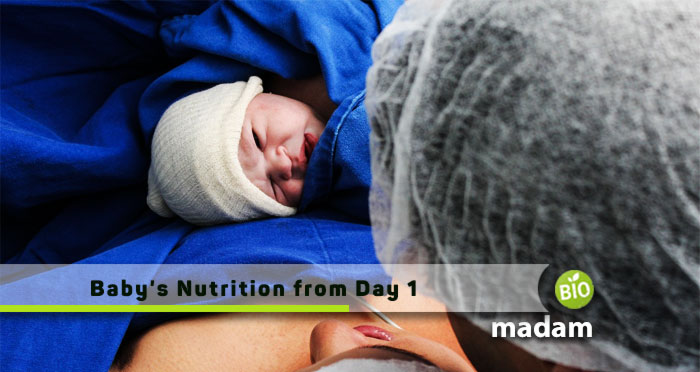Nurturing your baby’s nutrition from the very first day is an important part of creating a healthy foundation for their growth and development. As you embark on this unique journey as a parent, it’s essential to put in place basic building blocks that ensure your little one is getting all of the nutrients they need as they take those very first steps towards establishing lifelong habits of good health and wellness. In this blog post, we’ll provide tips and guidance on how to lay the right foundations when it comes to your baby’s nutrition – so read on to learn more!
Introducing Healthy Formula to Your Baby
As a new parent, it is natural to want to give your baby the best of everything, including their first baby formula. When it comes to introducing healthy formula to your baby, there are important factors to consider, such as when and how to start. For parents who prefer a natural and nutrient-rich alternative, goat milk-based formula is a popular choice. However, it is essential to do your research on this site and others like it before committing to anything.
Generally, it is recommended to wait until your baby is at least 6 months old before introducing formula, and slowly transition them off breast milk or regular formula to goat milk-based formula as per your pediatrician’s guidance. Remember to be patient and observant during the process, as every baby is unique and may require an adjusted approach to ensure a smooth transition.

Understanding the Basic Nutrients for a Baby’s Diet
As a parent, ensuring your baby receives the proper nourishment is of the utmost importance. Understanding the basic nutrients that make up their diet is a crucial step in this process. From protein to vitamins and minerals, each nutrient plays a key role in your little one’s growth and development. For instance, protein is vital for building and repairing tissues, while iron helps support brain development. Meanwhile, vitamins such as A, C, and D aid in maintaining a healthy immune system. By familiarizing yourself with these essential nutrients and incorporating them into your baby’s diet, you can set them up for a happy and healthy future.
Tips for Choosing Nutritious Fruits and Veggies
When it comes to introducing solids into your baby’s diet, healthy fruits and vegetables are a must. They provide essential vitamins and minerals and can even help boost their immune system. When choosing nutritious produce for your little one, there are some key tips to keep in mind. Firstly, always go for organic varieties if possible as this ensures fewer pesticide residues. Secondly, avoid any products that may be contaminated with bacteria, such as spinach or lettuce. Finally, select fruits and vegetables that are appropriate for your baby’s age. Introducing different foods early on can help promote a healthy appetite and diversity in their diet later in life – so get creative in the kitchen!
Creating Balanced Meals with Protein-Rich Foods
One important component of a balanced meal is protein, which helps support the growth and repair of tissues in the body. There are many delicious and healthy options for protein-rich foods that your baby is sure to love. Pureed chicken, turkey, and beef are great sources of protein, as are legumes like lentils and chickpeas. You can also incorporate protein-rich vegetables like peas and spinach into your baby’s meals. By focusing on incorporating a variety of protein-rich foods into your baby’s diet, you can help ensure they are getting the nutrients they need to thrive.
Making Smart Snack Choices for Your Baby
It can be tough to know what snacks are best for your baby. Choosing the right options can help promote healthy growth and development while avoiding empty calories. Fresh fruits and vegetables make excellent choices, providing vitamins, fiber, and natural sweetness without added sugars. Alternately, snacks like whole grain crackers or rice cakes can satisfy hunger without compromising on nutrition. And, when it comes to dairy options, Greek yogurt, and cheese are both great choices, offering protein and calcium to support growing bodies. With a bit of careful selection, making smart snack choices for your baby is easy and rewarding.
Supplements and Multivitamins
It’s important to ensure that they are getting all the essential nutrients they need in their diet. While baby food is typically formulated to contain all the necessary vitamins and minerals, there may be times when your little one needs a bit of a boost. This is where supplements and multivitamins come in. However, it’s important to do your research and consult with your child’s pediatrician before introducing any new supplements or multivitamins into their diet. Making informed choices about their nutrition can help set them up for a healthy future.

Ensuring Adequate Vitamin and Mineral Intake
Ensuring adequate vitamin and mineral intake is integral to your baby’s growth and development. Vitamins and minerals help support the body’s various processes, from building strong bones to aiding in cell repair. When incorporating vitamins and minerals into your baby’s diet, it is essential to look for products that are specifically designed for infants as they often lack the necessary levels of certain nutrients. You can also consider supplementation to help fill in any gaps if needed. Speak with your pediatrician and do your research to make sure you are providing the best nutrition possible for your little one!
Feeding babies involves careful consideration of nutritional needs. Introducing a variety of healthy foods and designing balanced meals are important to ensure your baby gets the vitamins and minerals they need in their diet. Get creative with fruits and veggies, include plenty of protein-rich foods, and choose healthy snacks for your baby, as these will encourage them to explore new tastes and textures while giving them the energy they need to grow.
Supplements can help fill in any nutrient gaps, so consult a doctor or dietician before taking any multivitamins or additional supplements such as fish oil or probiotics. With the right information and preparation, you can create well-balanced meals for your baby that are both nutritious and delicious.

Hi, they call me Jenna, and I am also known for achieving a gold medal during my Ph.D. in science life. I always had a dream to educate people through my utmost writing hobby. So, I chose this blogging path, and Biomadam gave me this opportunity to present for them. I now stand to entertain you. Continue reading my articles & discuss if you’ve any confusion through the comment section below.

